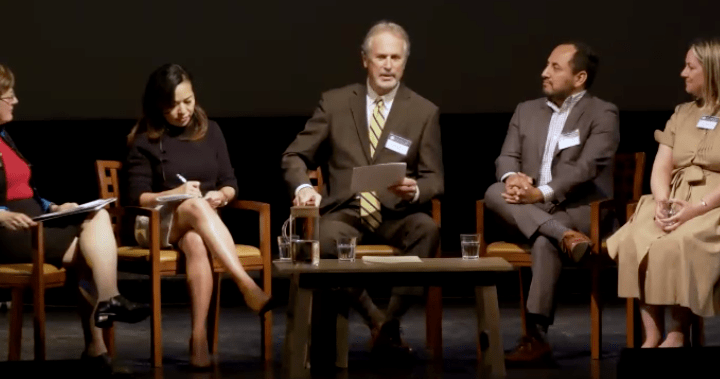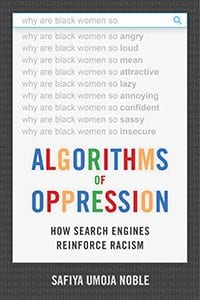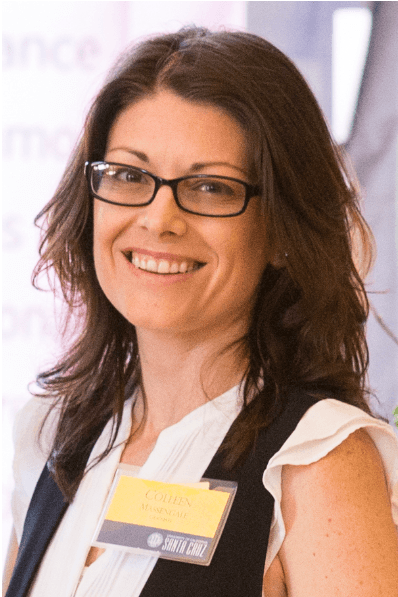Wednesday, January 23, 2019
4:00-6:00pm
Engineering 2, room 180
Today Silicon Valley is leading a supposed democratization of the financial sector. Now no longer will one have to rely on an expert financial advisor to invest their money, one can invest themselves. This transformation is happening right at the moment when women take over as managers of more than 50% of the wealth in the United States, while white men retain their hold on the technology industry (According to recent reports in the Washington Post and the Financial Times, SV is 83% white and 75% male). The effects of these biases on who is served and not served by SV innovations recently have been making headlines. However, little attention has been paid to how these changes are affecting one of the most powerful sectors — finance. In this session, we will consider who benefits and who loses as algorithms designed in SV increasingly direct how money flows. What vision of democracy and ethics shapes this supposed democratization?
As we discuss these specific developments, the panel will also consider these broader more fundamental questions:
- What moral visions today and in the past have guided the finance sector?
- What are the core moral issues in this moment?
- If we assume that further erosion of transparency and the further concentration of wealth are two of these moral issues, how do we visualize/render transparent, and thus more accountable, practices of wealth generation/concentration as wealth moves to SV (moves West)?
Participants:
Chris Benner, Dorothy E. Everett Chair in Global Information and Social Entrepreneurship, Director of the Everett Program for Technology and Social Change, Director of the Santa Cruz Institute for Social Transformation and Professor of Environmental Studies and Sociology at UCSC.
Sherry Paul CFP®, CIMA®, Private Wealth Advisor, Senior Portfolio Manager, UCSC Alumna. Sherry is a Private Wealth Advisor and Senior Portfolio Manager who leads an all-female wealth management team. She has been ranked by Forbes both as one of the Top 200 Women Wealth Advisors in America and as a Best-in-State Advisor. Sherry has been featured in the Forbes “Mentoring Moments” podcast series, in which successful women share pivotal moments of their career journeys. In 2018, she was one of 12 women selected to join Bloomberg New Voices, an initiative focused on diversifying news coverage in business and finance. Sherry authored What It’s Worth, an article published in Muse by Robb Report with two companion video interviews (Money Mission and Feel Empowered When You Spend), that explore the importance of having a money mission as part of a successful investment plan.
Respondent:
Nirvikar Singh, Director of the Center for Analytical Finance, Distinguished Professor of Economics at UCSC.
Moderator:
Jenny Reardon, Founding Director of the Science & Justice Research Center and Professor of Sociology at UCSC.
Co-sponsored by the UC Santa Cruz Science & Justice Research Center, the Center for Analytical Finance, and the Santa Cruz Institute for Social Transformation. The event is the second of a series of dialogues on the moral imaginaries of Silicon Valley being hosted by the Science & Justice initiative Seeing Like A Valley.
See also:
Rapporteur Report
By: Andy Murray, SJRC Graduate Student Researcher
This event marked the continuation of a conversation between UC Santa Cruz alumna Sherry Paul and members of the campus and Science & Justice communities about the connections between finance, algorithms, and justice. You can find the rapporteur report for the first event, “The Quants of Wall Street” here. Paul was joined by Chris Benner (Environmental Studies, Sociology), and Nirvikar Singh (Economics), who also spoke at “The Quants of Wall Street” in 2016, served as the respondent.
The conversation opened with an introduction by SJRC Director Jenny Reardon, who noted that the “wolves of Wall Street” have now moved over the hill to Silicon Valley. Are these west-coast ‘wolves’ nicer, more benign? Though this event brought together different people than were present for the first discussion, part of this follow-up’s aspiration was to address some of the structural questions generated at “The Quants of Wall Street.”
Speaking first, Sherry Paul began with the overarching themes of disenfranchisement, disillusionment, and “a co-opting of the word disruption by Silicon Valley.” She argued that the movement of finance westward to Silicon Valley and Silicon Valley has not really been disruptive; rather, wealth has been aggregated into the hand of the “same players.” There has been enormous privatization of wealth even in a culture that supposedly values transparency. Paul works managing money for individuals, not institutions. When she got her start in 1998, the primary questions were about charting portfolios and balancing risks. Paul said that she is not in the business of investment, but rather in the business of helping people chart their human journeys and life stories through money, using money as a form of empowerment. She noted that though we live in a capitalist democracy (a point that she would return to several times about the United States), we are taught almost nothing about finance, which again provoked some laughter—apparently of recognition—from the audience. Paul said she believes that a financial education is as important as the right to vote.
Paul went on to say that individuals and institutional investors make different buying and selling choices, and that she wondered what the impacts of individual wealth management decisions were on wealth creation and income and wealth disparity. While less than 12% of investors at present are women, before long over half of the wealth in the United States will be held by women. Paul believes that women will be the “true disruptors” of investment.
Paul repeatedly contrasted algorithmic investment, which she referred to as “the robos” with the type of individual investment management she does. In terms of ethics and oversight, she compared “the robos” to robber-baron capitalists and called their rise “the great robo robbery.” She argued that as “finance moves west,” there is even less oversight of these forms of investment, and this, combined with the low risk-tolerance of individual investors, reproduces inequality and wealth disparity.
At this point, Reardon paused to ask if anyone had questions, since Paul is a finance expert and some of her subject matter may have been unfamiliar to members of the audience. Someone asked if Paul did any algorithmic trading at all. She responded that in her work, she tries to focus on investor identity first and then figure out how to incorporate money into a greater purpose.
Chris Benner began his presentation with a caveat or apology for not knowing much about finance compared to the other presenters. He then turned to an exercise in symbolic politics, showing a photograph of the most expensive yacht in the world as a way to simultaneously illustrate conspicuous consumption practices; the growing economic role of places like China, India, and Malaysia; and the role that ‘old products’ like sugar and palm oil still play (those products helped generate the fortune of this particular yacht’s owner, Malaysian billionare Robert Knok). Benner noted the irony of finance, which he called a particularly “footloose” industry, being so concentrated in a small number of global centers. He also observed that while finance is critical for circulation in the economy as a whole, its role as a commodity has rapidly accelerated, alongside an increase in the credit market.
Benner pointed out that the value of data in Silicon Valley is a bit different than the value of more conventional industrial commodities. In asking where the value generated in Silicon Valley comes from, he identified an increase in the practice of adding incremental improvements to accumulated technological knowledge and using that to generate technological rents (using Apple as an example). Some of these rents, he argued are being protected through abuse of the patent system. Despite the fact that significant public-sector investment creates much of the value of these commodities, the public does not take an equity stake in them. Instead, there is a pervasive belief that society will benefit from innovation. This combines with network effects to produce “winner-take-all” markets, increased monopolization, and declining innovation. He connected this back to Paul’s point about financial literacy: if returns to capital are outpacing returns to labor, prevailing wisdom focusing on addressing inequality in the labor market does not apply, and we can no longer believe that the labor market is going to solve our problems. He concluded by calling special attention to racial disparities in wealth and in participation in financial markets and to deregulation as a significant driver.
There was another pause to solicit audience questions, of which there were none.
Nirvikar Singh next provided what he called a spontaneous response, attempting to draw out some of the most salient points of Paul’s and Benner’s presentations. He began from the starting point of how much wealth inequality we have in the United States and how much more severe it is than income inequality. He said that Sherry correctly identified some of the ways in which the financial system has the potential to exacerbate and perpetuate wealth inequality. He noted that without surplus wealth, even if financial investment is possible, diversification and portfolio options are limited. While in theory, finance can allow for wealth creation and for investment in people with good ideas, Singh noted that the idea that accumulated wealth is deserved is a normative position that is accepted more than it needs to be in the United States. In his discussion, Singh repeatedly used the example of Jeff Bezos, the world’s richest man (“at least, documented”), saying that he would still be pretty happy and would have followed the same course of action if it meant making $1 billion rather than $100 billion. He suggested looking to Europe as an example of “a different social contract,” where higher taxes on estates and income are normal. He said that the United States had made “weird choices” like allowing student loan debt to balloon. He said, using Germany as an example, that while taxpayer-funded higher education may produce waste, like people hanging around too long in graduate school (laughter in the audience, and someone says sarcastically, “that never happens here”), but suggested that this waste does not outweigh potential benefits.
Singh agreed with Benner about the growing abuse of patents and also identified an erosion of competition across the U.S. economy. He said that ultimately, “we are going to have to come to terms with technology.” While bringing down the cost of trading may have allowed “doctors and dentists” who already had surplus wealth “to engage in day-trading” (the audience laughed) it did not make people rich; it simply removed a small inefficiency. Allowing people to accumulate “human capital” without taking on undue burdens of debt could allow them to participate in the financial economy. He also identified a question about the role of artificial intelligence in society, even if it is not yet at the point where it can do the sort of customized life-cycle investment that Paul does. However, he argued, you have to have surplus wealth before any of this matters. First comes the issue of equal access to higher education and opportunities, then the issue of democratizing access to the financial sector.
After Singh’s comments, Reardon asked if Paul or Benner would like to respond to anything that had been said. Paul said her goal was for people of color and women to make more money, to know how to enter the sectors of the economy where wealth is created and how to manage their financial lives. She argued that this should be a part of education from elementary school onward, including classes on debt. She said this would be a preferable approach to “socializing money,” which she argued is not a solution “from a confidence standpoint” and would not do as much to change the ways in which these groups have been “systematically disenfranchised” from participating in what she called “the money-making conversation.”
Benner noted that recent evidence shows that people need and want economic stability more urgently than the ability to increase their wealth over time. He noted that there are some ideas about how to address some elements of the problem and provided an example of a San Francisco program that uses public funds to start savings accounts for elementary school students.
At this point, the discussion opened to members of the audience.
The first audience member mentioned questions about the spatial and demographic scope of re-inclusion, noting that there are significant global dimensions to “where wealth comes from.”
In response, Benner observed that some countries have wealth taxes. He told an anecdote about speaking to people in Silicon Valley who suggested that inequality is not a problem, as it is a sign of success and people coming to the area seeking opportunity. This provoked some laughter form the audience. This Silicon Valley audience, he recalled, suggested that poverty, not inequality, was the more important issue. Benner, however insisted that inequality is important to talk about.
Paul recalled that UC Santa Cruz is probably where she learned the phrase “think globally, act locally.” She returned again to the United States’ status as the largest capitalist democracy in the world and how surprising the lack of financial education is. She said that in New York, she works a lot with first-generation high school graduates. She observed how money, identity and poverty intersect with self-confidence. She recounted a story of packing some of these first-generation students into her office elevator banks and receiving confused looks from their everyday users—mostly men. She suggested that passing a pay equity bill would be the biggest step toward addressing inequality and seemed to agree with Singh that it is important to first put money in people’s hands, then give them the literacy to use it.
Singh pointed out that UC Santa Cruz does a poor job “levelling the playing field” and addressing inequalities. An audience member responded to this by recalling a past effort to include “an extreme lower-level service course” in the basics of finance but that this “hit resistance.” This part of the conversation fizzled a bit, and there seemed to be some unclear but palpable tension.
Paul mentioned that she is on the board of a nonprofit organization that teaches financial literacy to girls aged 10-12, which she pointed out is also around the time they tend to drop out of math and science. She argued that the time for these interventions is early. She discussed inviting kids into the kinds of spaces they wouldn’t be able to see themselves in otherwise as a way of breaking down barriers she said were “just fabrications.” She mentioned bringing girls to the floor of the New York Stock Exchange because she “want[ed] them to envision that one day they are going to IPO their company there.”
A graduate student in the audience identified an implied conflict between tools of redistribution and of empowerment, arguing that they don’t have to be separate. She also pointed out that under our capitalist system, not everyone can conceivably be a CEO. She pointed out that while instilling big dreams can be fruitful, it can also create people who are made fully responsible for their own failures yet live within a system in which not everyone is able to succeed. In a bit of a back-and-forth with Paul, she insisted that financial literacy is not going to solve the problem of the high cost of higher education and pointed out that pursuing higher education (and the debt that goes with it) is on some level, not really ‘a decision’ at all. Paul seemed to agree about the necessity of addressing both elements, echoing her earlier agreement with Singh. The graduate student made one final point: there was not enough acknowledgement of what she called “the harsh truth” that a perpetual growth economy ultimately depends on material elements and is fundamentally unstable and unsustainable.
This last point went unanswered as Reardon solicited a final round of comments as the event neared the end of its scheduled time.
Another graduate student followed up about Benner’s earlier description of the vast increase in debt and the commodification of finance. He asked for thoughts about the situation in which exotic financial products are being built on debt as a foundation and in which the US government is being pressured to tax less in order to borrow more and at better rates.
Reardon took this opportunity to mention a question from “The Quants of Wall Street” that had not yet been addressed: why did finance not change following the 2008 economic crisis. She suggested that part of the reason might be because of the ways in which financial instruments work with debt. Still, she wondered, if the financial crisis was not sufficient, what would it take to produce the will to make changes?
The graduate student pointed out that many people did not see the 2008 crisis coming and that its urgency precluded the opportunity for real political deliberation. He further suggested that if or when another crisis occurs, people may be better positioned to make demands on the state.
Benner responded by noting that while no one predicted the specific moment of the 2008 crisis, people had been anticipating a crisis since the erosion of Glass-Steagall. He asserted that we know how to solve these problems, but there is a bigger problem of political will.
Paul pointed out that the bailouts following the 2008 crisis did not ultimately benefit taxpayers. Instead, they created financial markets that produced deepening wealth inequality. In her final remarks, she lamented that algorithms are taking away what we used to value: the capacity to digest and disseminate data. She said she believes that engineering degrees are becoming less valuable than philosophy and humanities degrees (countering what seemed like a slight jab earlier about going into debt for a history degree). She argued that people should not distance themselves from money or demonize processes of accumulation, as she had. She said that she is happy to be able to share her observations. Reardon concluded by agreeing about the importance of the translation work that “organic intellectuals” like Paul can bring to the table.






